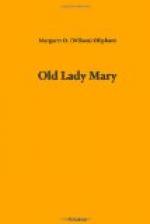“It is a very simple thing to do,” the lawyer said. “I will save you all trouble; nothing but your signature will be wanted—and that you give every day.”
“Oh, I should think nothing of the trouble!” she said.
“And it would liberate your mind from all care, and leave you free to think of things more important still,” said the clergyman.
“I think I am very free of care,” she replied.
Then the doctor added bluntly, “And you will not die an hour the sooner for having made your will.”
“Die!” said Lady Mary, surprised. And then she added, with a smile, “I hope you don’t think so little of me as to believe I would be kept back by that?”
These gentlemen all consulted together in despair, and asked each other what should be done. They thought her an egotist—a cold-hearted old woman, holding at arm’s length any idea of the inevitable. And so she did; but not because she was cold-hearted,—because she was so accustomed to living, and had survived so many calamities, and gone on so long—so long; and because everything was so comfortably arranged about her—all her little habits so firmly established, as if nothing could interfere with them. To think of the day arriving which should begin with some other formula than that of her maid’s entrance drawing aside the curtains, lighting the cheerful fire, bringing her a report of the weather; and then the little tray, resplendent with snowy linen and shining silver and china, with its bouquet of violets or a rose in the season, the newspaper carefully dried and cut, the letters,—every detail was so perfect, so unchanging, regular as the morning. It seemed impossible that it should come to an end. And then when she came downstairs, there were all the little articles upon her table always ready to her hand; a certain number of things to do, each at the appointed hour; the slender refreshments it was necessary for her to take, in which there was a little exquisite variety—but never any change in the fact that at eleven and at three and so forth something had to be taken. Had a woman wanted to abandon the peaceful life which was thus supported and carried on, the very framework itself would have resisted.




